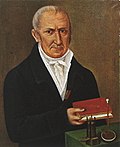Alessandro Volta
Alessandro Volta[edit]

Alessandro Giuseppe Antonio Anastasio Volta (18 February 1745 – 5 March 1827) was an Italian physicist and chemist, known for his pioneering work in electricity and power. He is credited with the invention of the voltaic pile, the first chemical battery, which provided a continuous source of electric current.
Early Life and Education[edit]
Alessandro Volta was born in Como, in present-day Italy, to a noble family. From a young age, he showed a keen interest in the natural sciences. Volta was educated at the Jesuit school in Como and later attended the University of Pavia, where he studied physics and chemistry.
Career and Discoveries[edit]
Volta began his career as a professor of physics at the Royal School in Como in 1774. In 1775, he improved and popularized the electrophorus, a device that produced static electricity. His work on electricity led him to the discovery of methane in 1776, which he isolated and studied.
Invention of the Voltaic Pile[edit]

In 1800, Volta invented the voltaic pile, which was the first device to produce a steady electric current. The voltaic pile consisted of alternating discs of zinc and copper, separated by pieces of cardboard soaked in saltwater. This invention was a significant breakthrough in the study of electricity and laid the foundation for the development of electrochemistry.
Later Work and Honors[edit]
Volta's work earned him widespread recognition. In 1801, he was invited to Paris by Napoleon Bonaparte, who awarded him the title of Count and a gold medal for his discoveries. Volta continued his research and teaching at the University of Pavia, where he held the chair of experimental physics.
Legacy[edit]
Volta's contributions to science have had a lasting impact. The unit of electric potential, the volt, is named in his honor. His invention of the battery paved the way for the development of modern electrical devices and technologies.
Related Pages[edit]
Gallery[edit]
-
Diagram of a voltaic pile
-
Painting of Volta by Bertini
-
Aula Volta at the University of Pavia
-
Volta's chair at the University of Pavia
-
Volta's first publication
-
Portrait of Alessandro Volta
-
Volta's Battery
-
Diagram of a Voltaic Pile
-
Painting of Volta by Bertini
-
Aula Volta in Pavia
-
Chair of Alessandro Volta at the Museum for the History of the University of Pavia
-
Volta's First Publication
Ad. Transform your life with W8MD's Budget GLP-1 injections from $75


W8MD offers a medical weight loss program to lose weight in Philadelphia. Our physician-supervised medical weight loss provides:
- Weight loss injections in NYC (generic and brand names):
- Zepbound / Mounjaro, Wegovy / Ozempic, Saxenda
- Most insurances accepted or discounted self-pay rates. We will obtain insurance prior authorizations if needed.
- Generic GLP1 weight loss injections from $75 for the starting dose.
- Also offer prescription weight loss medications including Phentermine, Qsymia, Diethylpropion, Contrave etc.
NYC weight loss doctor appointmentsNYC weight loss doctor appointments
Start your NYC weight loss journey today at our NYC medical weight loss and Philadelphia medical weight loss clinics.
- Call 718-946-5500 to lose weight in NYC or for medical weight loss in Philadelphia 215-676-2334.
- Tags:NYC medical weight loss, Philadelphia lose weight Zepbound NYC, Budget GLP1 weight loss injections, Wegovy Philadelphia, Wegovy NYC, Philadelphia medical weight loss, Brookly weight loss and Wegovy NYC
|
WikiMD's Wellness Encyclopedia |
| Let Food Be Thy Medicine Medicine Thy Food - Hippocrates |
Medical Disclaimer: WikiMD is not a substitute for professional medical advice. The information on WikiMD is provided as an information resource only, may be incorrect, outdated or misleading, and is not to be used or relied on for any diagnostic or treatment purposes. Please consult your health care provider before making any healthcare decisions or for guidance about a specific medical condition. WikiMD expressly disclaims responsibility, and shall have no liability, for any damages, loss, injury, or liability whatsoever suffered as a result of your reliance on the information contained in this site. By visiting this site you agree to the foregoing terms and conditions, which may from time to time be changed or supplemented by WikiMD. If you do not agree to the foregoing terms and conditions, you should not enter or use this site. See full disclaimer.
Credits:Most images are courtesy of Wikimedia commons, and templates, categories Wikipedia, licensed under CC BY SA or similar.
Translate this page: - East Asian
中文,
日本,
한국어,
South Asian
हिन्दी,
தமிழ்,
తెలుగు,
Urdu,
ಕನ್ನಡ,
Southeast Asian
Indonesian,
Vietnamese,
Thai,
မြန်မာဘာသာ,
বাংলা
European
español,
Deutsch,
français,
Greek,
português do Brasil,
polski,
română,
русский,
Nederlands,
norsk,
svenska,
suomi,
Italian
Middle Eastern & African
عربى,
Turkish,
Persian,
Hebrew,
Afrikaans,
isiZulu,
Kiswahili,
Other
Bulgarian,
Hungarian,
Czech,
Swedish,
മലയാളം,
मराठी,
ਪੰਜਾਬੀ,
ગુજરાતી,
Portuguese,
Ukrainian


